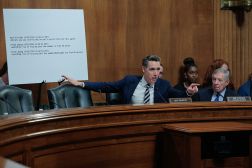Civic tech is not just a Democratic movement —experts

In the face of continuous rumors and uncertainty around what tech projects and people may last or leave during President-elect Donald Trump’s administration, experts Friday, including U.S. CIO Tony Scott, sought to pitch the Obama administration’s technology progress as nonpartisan.
“Some of our biggest supporters and fans have actually been on the Republican side [of Congress] during this administration, so I hope that spirit continues and I expect that it will,” Scott said Friday at a Politico event.
When questioned about staying if he were asked back, Scott said “I think it depends.”
His remarks on the subject seemed to suggest that he might consider it if the administration continues in a similar direction with its technology-related efforts.
“I’m really excited about the momentum that we’ve got going, and if it looks like that’s something that makes sense,” he said. “One way or the other, first you’ve got to be asked — nobody’s asked yet.”
Scott then urged technologists to stay engaged.
“We’ve got to stay engaged — I don’t think it’s even an option,” Scott said. “If you care about our country, if you care about how government works, the credibility of our institutions, government being one of the key ones, you gotta stay engaged in this space, there’s just no backing away I don’t think.”
Phaedra Chrousos, now chief innovation officer of Libra Group and a founder of the General Services Administration’s Technology Transformation Service during her time in government, said people have been asking her for advice on staying or leaving government.
“I’ve been getting a lot of people coming to me and asking ‘Should I stick around?’ And I’ve been telling people, ‘Go where you think you will make the most impact,’” she said. “That’s just my general philosophy.”
But Chrousos also seemed to be preparing the crowd Friday at the Newseum to see some changes. She noted the younger technologists in government move jobs fairly quickly in the private sector, and that mobility is normal and should be acknowledged.
“We have to remember that this is a younger generation of techies that move through the ecosystem, through the private sector pretty quickly,” she said. “And they’re going to move through the ecosystem that’s been created now in the civic tech movement. You might get an 18F-er that then goes to [Department of Justice], then the digital service team, or goes to Code For America, or goes to start a civic tech company or work at a civic tech incubator.”
She added: “And I think that we need to realize that’s the reality that we’re faced with, and that we should try and enable that mobility rather than keep people in more traditional structures.”
This movement, she said, isn’t a problem as long as there is continuity in knowledge management, “and you can pass the baton along.”
“I think a fresh set of eyes is always important,” she said. “And I think the more people move around the more they’ll gain a really holistic perspective of the government.”
Chrousos predicted the younger digital transformation government technology community might see some movement, just as the Government Digital Service in the United Kingdom has seen its people move to different ministries, and to state and local governments.
U.S. Chief Technology Officer Megan Smith, in remarks later during the event, also seemed to imply that many in the technology community are interested in state and local work.
In response to a questions of whether pitching those in Silicon Valley to work for government would be more difficult during a Trump administration, Smith said: “I think people are open to doing this, and that they’re excited about doing this in all of the different places. You know there’s state and local, there’s Code For America, there’s external open gov, there’s so many organizations now.”
When she was later asked to elaborate specifically on working for a Trump administration, Smith noted many technologist positions were not set up as political positions.
“So these people are excited about the work that they’re doing, they’re committed to it, they’re doing it and so it’s exciting to see them committed into that work,” she said.
Seamus Kraft, executive director of the OpenGov Foundation and a former Republican congressional staffer, noted that this time is “a beautiful opportunity to put the real core values of civic technology and open government gov tech, whatever hashtag you want to put in front of it, to the test.”
He noted that many government technology problems are not tied to a party.
“But bad software, bad data, bad process — that knows no party affiliation, and I think that’s where the new administration starts,” he said. “The biggest risk to the progress going away though, is those who’ve created it, and who are here right now, some of them in this room, walking away right now. And the next administration, no matter how you felt about the election result, needs you just as much as President Obama needed you and called you out.”
He noted that the new administration needs, at a minimum, perspective from past feds so they know what state everything is in.
“I think that a lot of these issues haven’t been on the Trump team’s list,” Kraft admitted, but added, “I do know that there are some good people just starting to get in to place right now, who need to talk to everybody who’s here right now, who’s created these projects.”
The futures of some of those programs, like 18F or the U.S. Digital Service, however, are still uncertain. But Kraft noted that, “The promise of 18F really wasn’t going to be tested until an administration changed.”
It’s worth noting that House Majority Leader Kevin McCarthy recently tweeted: “We need to modernize government — programs like @18F and @USDS hold great potential for our country.”
Chrousos mentioned the tweet on Friday: “That was a great sign to all of us that this is a nonpartisan issue.”
But when it comes to retaining the workforce, it’s common knowledge that many technologists lean left, and Kraft did acknowledge that the pool of technologists who share common ideologies with the new administration is small. Kraft noted that programs like 18F, USDS and the Sunlight Foundation are slowly removing the need for partisan affiliation in this kind of work.
Chrousos said “people don’t join the Peace Corps because they’re Republican or Democrat, or because Trump’s in office or Obama’s in office.”
“They join because they want to do some good, serve their time,” she said. “And I think we need to get to the point where this is not a Democratic movement — this is a good for government, patriotic movement, regardless of party affiliation.”
Scott said after talking to “hundreds of people,” what motivates them is “solving big, hard problems.”
“And that’s what gets people up in the morning and gets them going, and to the extent we can work on that problem set, I think you’re going to get the best America has to offer,” he said. “I don’t think it’s a party issue.”
Technologists under the Obama administration have worked on some problems that could be perceived as partisan, but Scott urged people to avoid letting “the micro dominate the macro.”
“We get challenges in Veteran’s Administration, in IRS, in the Department of the Interior,” he said. “I mean there’s no agency of the federal government or anything that it does that isn’t without its challenges. So maybe priorities shift among certain areas, maybe one thing goes away, but there’s tons of other sort of opportunities. So it might be a problem in a micro case but I think in the macro there’s lots of stuff to do.”
And when it comes to what priorities from this administration will continue, Scott noted that nobody has been saying open source or open data efforts should stop.
“I think the question really is, what else on top of that gets done? Or how does the direction shift at all?” he said. “And I don’t think anybody knows that yet. I think it’s a little bit premature to sort of make that call.”
Scott also said the “digitization march is inevitable.”
“And really the only question is: How fast is it gonna go?” he said. “Does this next administration accelerate or not put an emphasis on it? And again I think it’s too early to tell.”






